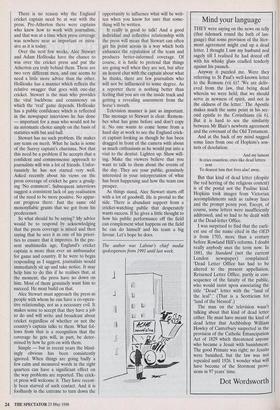Mind your language
THEY were saying on the news on telly (that tidemark round the bath of lan- guage) that some provision of the Stor- mont agreement might end up a dead letter. I thought I saw my husband nod sagely till I realised he had dozed off with his whisky glass cradled tenderly against his paunchh.
Anyway it puzzled me. Were they referring to St Paul's well-known letter to the Romans (vii 6)? 'We are deliv- ered from the law, that being dead wherein we were held; that we should serve in newness of spirit, and not in the oldness of the letter.' The Apostle makes much the same point in his sec- ond epistle to the Corinthians 6). But it is hard to see the similarity between Mr Blair's newborn agreement and the covenant of the Old Testament.
And at the back of my mind nagged some lines from one of Hopkins's son- nets of desolation:
And my lament Is cries countless, cries like dead letters sent
To dearest him that lives alas! away.
But that kind of dead letter (despite the red herring of the religious context) is of the postal not the Pauline kind. Hopkins took images from Victorian accomplishments such as railway lines and the prompt penny post. Except, of course, some letters were insufficiently addressed, and so had to be dealt with at the Dead-letter Office.
I was surprised to find that the earli- est use of the name cited in the ()ED is from 1703, more than a century before Rowland Hill's reforms. I doubt really anybody uses the term now. In 1881, the Standard (not the current London newspaper) complained: `Dead Letter Office has had to be altered to the present appellation, Returned Letter Office, partly in con- sequence of the fatuity of the public, who would insist upon associating the title "Dead" letter with the "land of the leal".' (That is a Scotticism for `land of the blessed'.) The man on the television wasn't talking about that kind of dead letter either. He must have meant the kind of dead letter that Archbishop William Howley of Canterbury suspected in the provision of the Catholic Emancipation Act of 1829 which threatened anyone who became a Jesuit with banishment. The good Primate was right; no Jesuits were banished, but the law was not repealed until 1926. I wonder what will have become of the Stormont provi- sions in 97 years' time.
Dot Wordsworth


































































 Previous page
Previous page